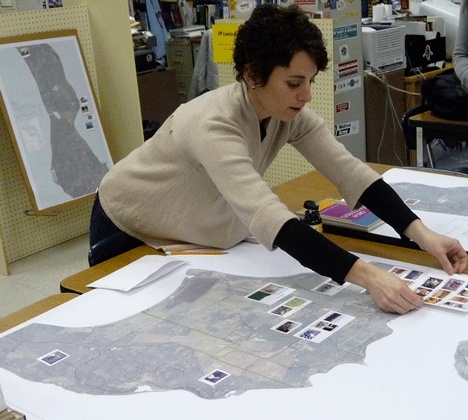Do you know where that grapefruit came from?
How about that head of lettuce?
Did it travel from California and use up many gallons of fuel to get to your table?
You may not even want to consider how much it cost (the earth) to get that Guatemalan mango to your mouth.
Aimie Vallat is a local resident who would like you to know about the food that can be found much closer to home.
Vallat is a recent graduate of the master’s program at the Center for Creative Change at Antioch University, Seattle.
Vallat’s program focused on how to use communication and media for social change.
As a project for her master’s degree, she volunteered this past spring with Transition Whidbey for its Food Asset Mapping Project.
Transition Whidbey’s basic purpose is to create a plan to catalyze greater food self-sufficiency on the island.
Mapping local food involves looking at resources such as farms, food distributors, community gardens and farmers markets and documenting exactly where local food is available on the island.
Britt Walker is a founding member of Transition Whidbey and sees Vallat as an invaluable asset to the program and the community.
“Aimie dove right into working on Transition Whidbey’s Food Asset Mapping Project and has been a powerhouse from the get-go,” Walker said.
“She also got the ball rolling on convening community potlucks in her home around food-asset mapping and getting others involved, as well as spearheading a food-asset map brochure so people will have a better understanding of what this project is trying to accomplish.”
A good part of Vallat’s master’s degree work involves finding new ways of communicating change to the public.
To that end, she created a short documentary entitled “Transitioning Whidbey,” based on the mapping project and the work that Transition Whidbey is doing to change the way the community looks at food resources and how it aims to create a responsible, generative and renewable food system locally.
Vallat’s almost seven-minute film won “Best Documentary” at the Clyde Theatre’s RainDance Short Film Festival and will be shown during Choochokam Arts on July 11 and 12 at the Clyde in Langley.
“The film is exciting because it has the ability to reach a broad audience,” Vallat said.
“Transition Whidbey is a good platform on which a discussion about food resources, strengthening the local economy and introducing alternative energy can take place,” she added.
Vallat also extended the project to the eighth-grade students of science teacher Terry Welch at Coupeville Middle School, who were challenged to develop a photo essay that would compliment the efforts of the food-asset mapping work.
The idea, Vallat said, was to use photos and videos to tell meaningful stories that would bring awareness to relevant social, political and environmental issues, and to focus attention on where food comes from and how it gets to the community.
“I wanted the students to learn how to tell a visual story while becoming aware of where the food is,” Vallat said.
The team traveled around the island to various farms.
Eighth-grader Katie Reid learned that farms need customers if they are to survive.
“Some farmers in Coupeville actually lose money, and they only do farming for fun. This presents a serious issue that needs to be addressed. Everyone needs to buy more food locally to keep our farmers in business,” Reid said.
Reid’s classmate Cole Weinstein’s eyes were opened to what happens to the food grown on the island.
“I learned about the steps it takes for the food to be processed and shipped off in packages to stores,” Weinstein said.
The students were also asked to consider the repercussions of buying food within a 100-mile radius of where they live.
“I found out about some farms I didn’t even know existed,” student Emylie Kheener said.
“Plus, I found out about what is grown where and when they sell it. So, I can buy more locally grown fruits and veggies and start reducing my carbon footprint.”
Vallat also traveled to island farmers markets, festivals and even to a meeting with Coupeville’s mayor.
“I learned so much about the farmers, and it was important to me that the students know that creating social change is not just about protest. It’s also about starting a conversation in communities,” Vallat said.
Three large maps were created from Vallat’s research, complemented by the photos of students.
Vallat said that having the students involved, if only in a small way, is important to the whole idea of sustainability.
“If we’re to create this new way of living, then there needs to be lots of different voices at the table,” she said.
The team ended up with a series of custom-made maps of Central Whidbey embedded with student images of local farms.
The finished food-asset maps did some traveling, as well, having been displayed at the Earth Day celebration at Bayview Corner in April, at the Sustainability Festival in Oak Harbor in May, and finally at Coupeville Middle School, where they will remain.
Transition Whidbey holds first Wednesdays “Potlucks with a Purpose” that focus on sustainability issues. The next one is from 6:30 to 9:30 p.m. Wednesday, July 1 at Langley United Methodist Church Fellowship Hall at Third Street and Anthes Avenue.
Normally, the potluck accompanies an informative and interactive program, but this one is a fundraiser for Transition Whidbey. Guests are asked to bring a dish to serve six and one’s own plate and utensils.



